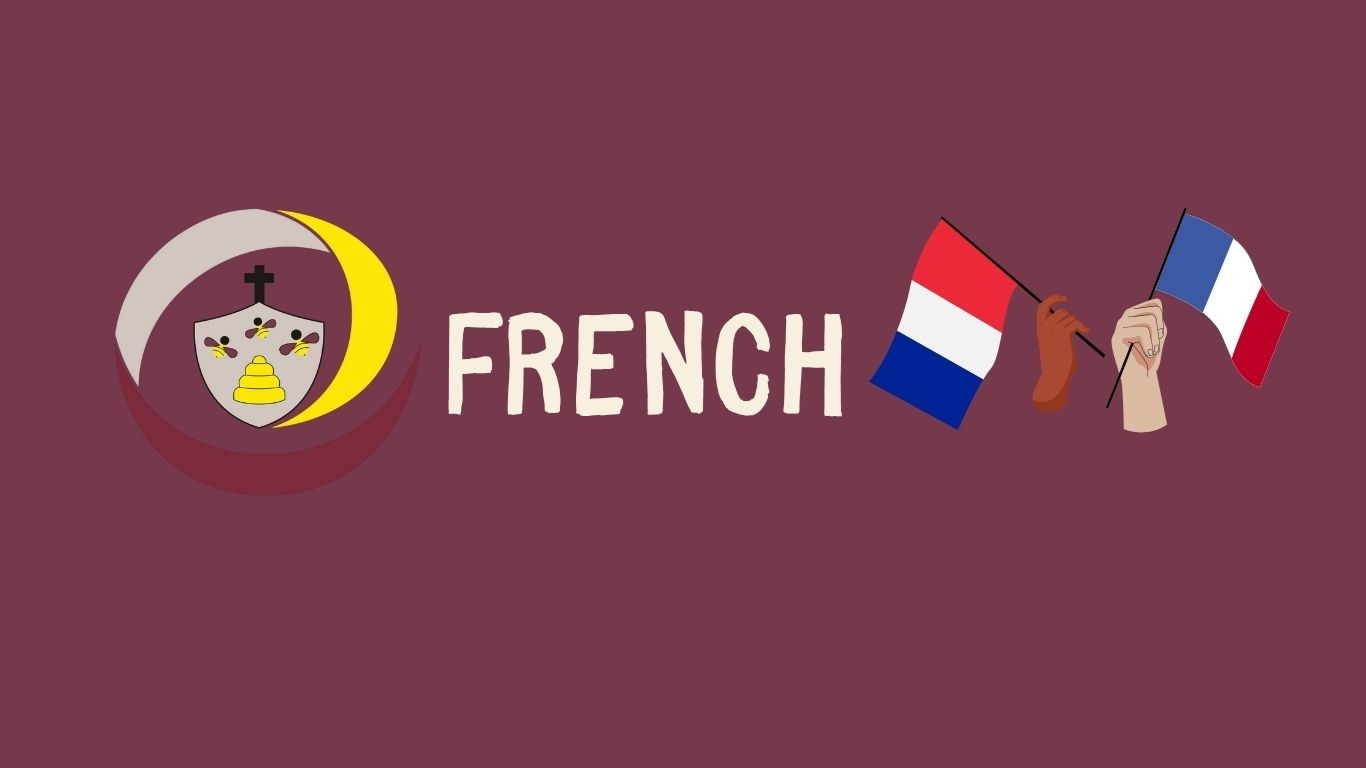
French at St Ambrose: Inspiring Lifelong Learners
At St Ambrose, our Foreign Languages curriculum is designed to be broad, vibrant, and ambitious: rooted in the National Curriculum for Languages and guided by the values of Catholic Social Teaching. Through the Language Angels scheme of work and resources, we aim to foster a love of language learning that empowers pupils to communicate confidently, appreciate cultural diversity, and grow as global citizens as we develop their Cultural Capitals.
Intent, Implementation and Impact
National Curriculum Alignment Our programme reflects the statutory aims of the National Curriculum, promoting language learning as a liberation from insularity and a gateway to other cultures. Pupils are taught to:
Understand and respond to spoken and written language
Communicate with fluency and spontaneity
Write for different purposes using appropriate grammar
Catholic Social Teaching Integration Language learning supports the dignity of every child and encourages solidarity with others. By exploring different cultures and languages, pupils develop:
Respect for human dignity
A sense of community and global responsibility
Appreciation of cultural diversity and identity
Structured and Supportive Learning At the start of each academic year, pupils engage with Language Angels phonics and grammar units, laying a strong foundation for accurate pronunciation and grammatical understanding. Every lesson is enriched with:
Flashback quizzes to reinforce prior learning
Knowledge Organisers to support vocabulary retention and thematic understanding
High Expectations for All We believe every child can succeed. Our curriculum sets high standards, encouraging pupils to reach their full potential and continue language learning beyond Key Stage 2.
All classes at St Ambrose have access to a high-quality foreign languages curriculum delivered through the Language Angels scheme of work and resources. In Key Stage 2, class teachers deliver weekly, well-planned lessons that progressively build pupils’ skills in listening, speaking, reading, writing, and grammar.
Children will acquire, use, and apply a growing bank of vocabulary and grammar, organised around age-appropriate topics and themes. These foundational blocks evolve into more fluent and authentic language use over time.
Teachers track pupil progress closely, ensuring they know where each child is on their language learning journey.
Lessons are designed to recycle, revise, and consolidate previously learned content while introducing new skills.
Language Angels units are grouped into Teaching Type categories to ensure appropriate challenge and progression:
| Teaching Type | Suitable For | Focus Areas |
|---|---|---|
| Early Language Units | KS1 & Year 3 | Basic vocabulary, nouns, articles, 1st person verbs |
| Intermediate Units | Years 4–5 | Possessives, adjectives, negatives, conjunctions, regular verb conjugation |
| Progressive Units | Year 6 | Opinions, irregular verb conjugation, extended writing |
| Creative Curriculum | Advanced Year 6 learners | Personalised responses, authentic language tasks |
Lesson Duration:
Early Language & Core Vocabulary: ~30 minutes
Intermediate & Progressive Units: ~45 minutes
Grammar Integration: Grammar is taught discreetly and progressively across all units. Teachers also use Grammar Explained units to deepen understanding.
A whole-school unit planner outlines what each class will learn and when, ensuring consistent progression.
Each unit includes 6 fully planned lessons with clear objectives and aims.
Lessons feature:
Interactive whiteboard materials
Speaking and listening tasks
Differentiated desk-based activities (with optional homework)
Reading and writing tasks, including extended activities for native speakers
Assessment: Each language skill, speaking, listening, reading, and writing, is assessed each term in line with school policy.
Progression Map & Grammar Grid: These tools help teachers ensure pupils are learning the right grammar at the right time and progressing across all key skills.
Miss Morgan, our French Subject Lead, leads a curriculum that not only meets the expectations of the National Curriculum but also inspires every pupil to SHINE. Through engaging and inclusive lessons, she ensures that all children are supported and challenged to reach their full potential as confident and curious linguists.
Dynamic and Evolving The curriculum is reviewed annually to ensure it remains relevant, engaging, and in line with DfE expectations. Long-term and short-term planning ensures progression in language knowledge year after year.
Each unit is designed to build complexity over time, like constructing with Lego blocks:
Lessons within a unit build on each other, gradually increasing linguistic sophistication.
Pupils reuse and recall previously learned language to improve fluency and accuracy.
Core Language Skills Pupils develop the four key skills, listening, speaking, reading, and writing, with phonics and grammar taught in an age-appropriate way. This foundation supports not only future language learning but also enhances literacy and attainment across other subjects.
Curiosity and Enjoyment Our curriculum sparks genuine interest and enjoyment in learning languages. Pupils explore engaging topics and themes that connect language to identity, culture, and global awareness.
Cultural Understanding Through language, pupils gain deeper insights into other ways of life, fostering empathy, respect, and intercultural understanding, key values in both the National Curriculum and Catholic Social Teaching.
Lifelong Learning Ultimately, our goal is to nurture life-long language learners who are equipped to thrive in a multicultural world and contribute positively to society.
Enrichment Opportunities To extend learning beyond the classroom, we offer:
Whole-school assemblies celebrating languages and cultures
A vibrant French Club for pupils to explore language through games, songs, and conversation
Language Angels logins for every KS2 pupil, enabling access to interactive resources and activities at home
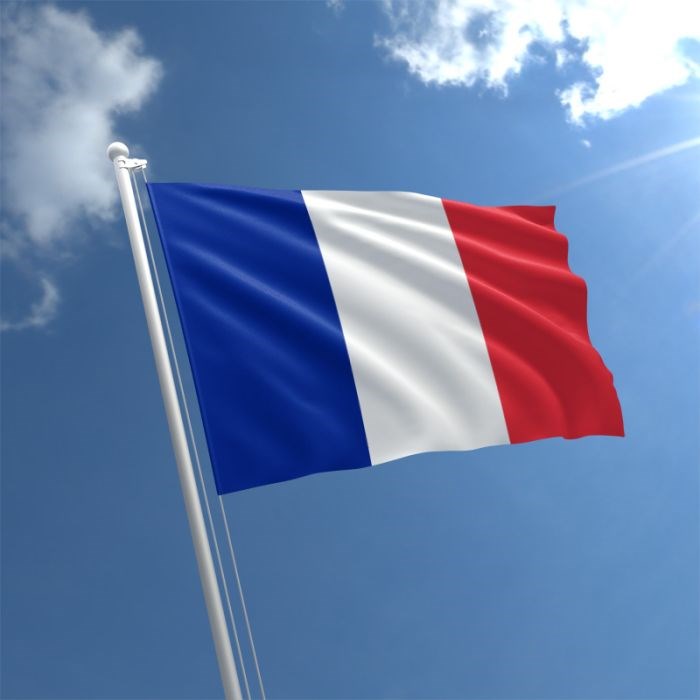
Curriculum
At our school, we follow the National Curriculum aim for Modern Foreign Languages, enabling pupils to foster curiosity, deepen their understanding of the world, and express their ideas and thoughts in another language with confidence.
As French Lead, Miss Morgan ensures that our curriculum is carefully sequenced, beginning each academic year with a focus on phonics or grammar to establish strong foundations for accurate pronunciation and understanding. Each lesson builds on prior learning, helping children to develop their knowledge progressively and purposefully. We use Language Angels to support our teaching and to provide engaging, high-quality resources that reinforce these key skills both in school and at home.
Our French curriculum reflects the Catholic Social Teaching principles of dignity of the human person and solidarity, as children learn to appreciate and respect other cultures and languages, recognising that we are all part of one global family under God. Through learning French, our pupils grow not only in knowledge but also in empathy, understanding, and joy in the diversity of God’s creation.
“A gentle answer turns away wrath, but a harsh word stirs up anger.” Proverbs 15:1
This reminds us that the words we speak, in any language, have the power to build peace, friendship, and understanding.
Learning a new language reminds us of the story of Pentecost, when the Holy Spirit enabled the disciples to speak in many languages so that everyone could understand the Good News of Jesus.
“All of them were filled with the Holy Spirit and began to speak in other tongues as the Spirit enabled them.” Acts 2:4
Catholic Social Teaching
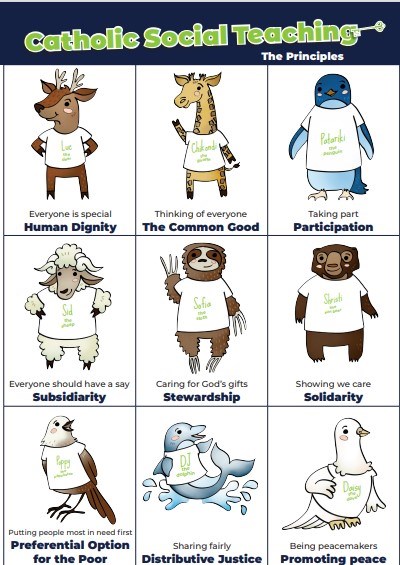
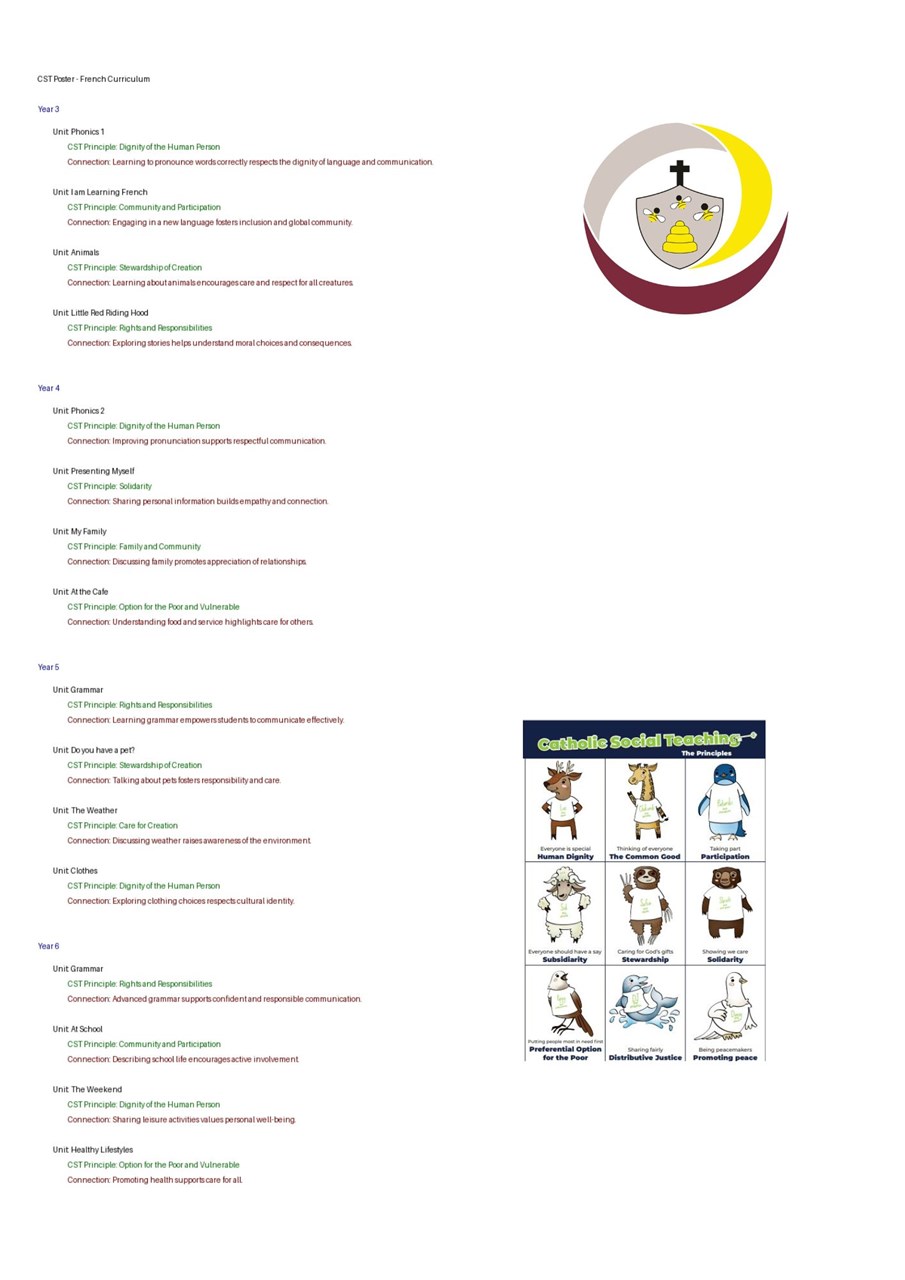
Our French curriculum is rooted in the Catholic Social Teaching Principles, helping pupils recognise that learning another language is a way to live out their faith. Through exploring French culture and communication, children grow in solidarity, respect, and an understanding of the dignity of every person. They learn that we are all part of one global family under God and are encouraged to use their voices with kindness and empathy. In this way, our French lessons reflect our school mission: We do our best by following Jesus.
Catholic School Pupil Profile
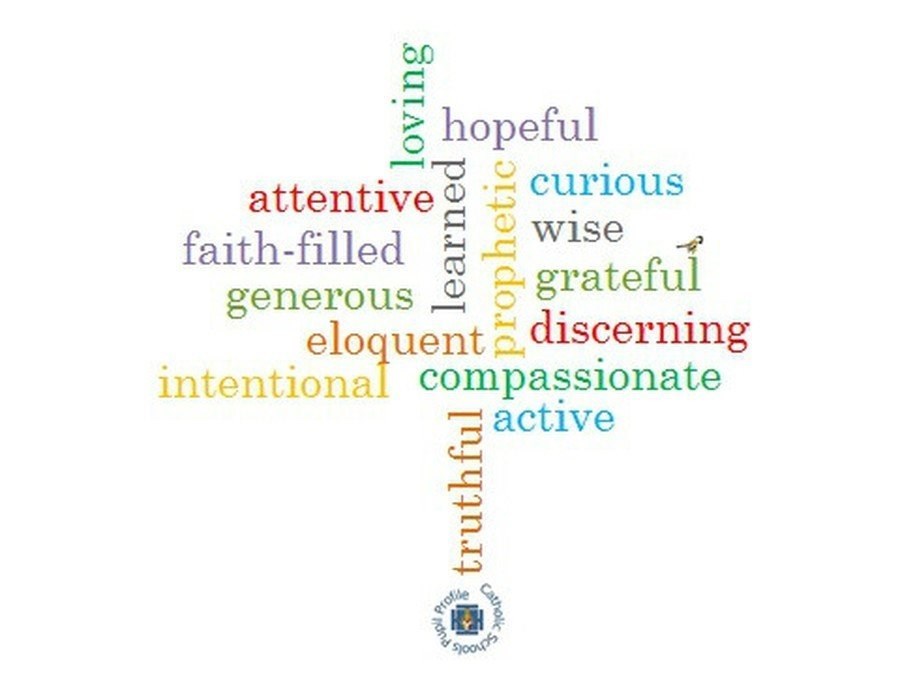
Learning French helps pupils become curious and wise, as they explore a new language and culture, asking questions and making connections with their own experiences. Through listening, speaking, reading, and writing, children develop attentiveness and discernment, noticing patterns in vocabulary and grammar and choosing accurate expressions. Communicating in another language nurtures eloquence and truthfulness, as pupils learn to express themselves clearly and honestly in both French and English.
Studying French culture and traditions encourages pupils to be compassionate and loving, appreciating diversity and respecting others. Singing French songs or learning prayers supports being faith-filled and hopeful, while collaborative activities promote generosity and active participation. Pupils also become intentional, planning their learning and practicing with purpose, and grateful, valuing the gift of communication and the richness of global cultures.
What our children say about French
Speaking French is easy and fun. Some of the words sound funny. Songs at the end of lessons help. You learn lots of new words and its fun to learn about the animals, phonics, greetings. French is fun! Language Angels gives us songs and games which make learning French easier!
Speaking and listening are key skills in French lessons, helping pupils build confidence and improve pronunciation. Through simple conversations and games, they learn to understand and respond naturally in French.
Below you can see a couple of images from our French lessons in school.
The children were utilising writing and speaking skills in this lesson and working hard to receive French stickers- bon effort!
SUBJECT ENRICHMENT
To further enrich the learning of French across Key Stage 2, children are encouraged to log in to Language Angels from home, where they can access interactive games and songs used in lessons. This supports the National Curriculum aim for pupils to foster curiosity and deepen their understanding of the world through language learning. The children love practising their French in this fun and engaging way, so much so that they have asked Miss Morgan to start a French Club! One where they can use the iPads at break or lunchtime to explore Language Angels together. This exciting new club will launch later this academic year, thanks to our enthusiastic pupils and their love of learning!
Miss Morgan also enriches our curriculum each year by leading a whole-school French assembly, linked to important dates in the French calendar such as Joyeux Noel, Bastille Day or La Chandeleur. These assemblies are joyful opportunities to celebrate our learning, develop cultural capital, and appreciate the diversity of God’s world — all while recognising our shared humanity and the richness of different traditions. Year 3 even make French Christmas cards!
Our French enrichment reflects the Catholic Social Teaching principles of solidarity and dignity of the human person, and promotes the British Values of mutual respect and tolerance. Through these experiences, pupils learn to value other cultures and languages, growing in friendship and understanding with our global neighbours. In all we do, we strive to live out our school mission:
“We do our best by following Jesus.”